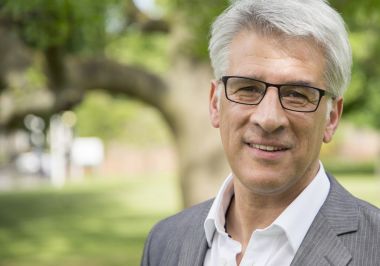Steve Chalke: A Conservative government provides the Church with huge opportunities, but we're not ready for it

Last night I caught up with Steve Chalke to hear about his new venture: Steve Chalke on Leadership.
In his typically charismatic and engaging way, Chalke spoke of his excitement about the possibilities available to the Church in the current political climate. Looking ahead to the prospect of five, or possibly 10, years of Conservative party rule in the UK, he said the opportunities are monumental. "There is more opportunity for the local church now than at any other point in my life."
There is no doubt that the Conservative party, led by David Cameron, has an idealogical aim for a small state. With the economic case for austerity increasingly under question, it is more difficult to disguise public sector cuts as necessary for reducing the deficit. Instead, as we heard in Osbourne's summer budget, the Conservatives want to move Britain from a "low wage, high tax, high welfare society" to a "higher wage, lower tax, lower welfare society."
To coin a phrase from 2010, the Conservatives want a "small state; big society."
Chalke insisted that, like it or not, this new "social contract" is a reality – and it's one that provides the church with huge opportunities. But there is a stumbling block, he said. He has been hearing from church leaders who say they feel unable or unequipped to take up the opportunities they are now presented with.
A recent snapshot survey of church leaders by Oasis Trust, which Chalke founded, revealed several concerning trends that he is hoping to address at his upcoming event. The primary problem was inadequate training for church leaders. Chalke spoke of a disconnect between the skills taught in theological college and the skills needed to actually lead a church.
"The skills I have learnt to run a church are all skills I didn't learn in my theological college," he said. "Being able to read a spreadsheet is more important than being able to read Hebrew text.
"People leave knowing how to decline Greek nouns and lead a funeral, but do not have the skills to operate a budget, negotiate contracts with the council, raise funds or promote a church."
This brought us on to what must be Chalke's favourite topic: the church's engagement with the community. Having been at the centre of a theological debate on evangelicalism last year (the Oasis Trust had its Evangelical Alliance membership discontinued over its favourable stance towards same-sex marriage), he said "the first controversial thing I said was 'churches should do community.'"
Twenty years after first making that statement, Chalke has arguably won that battle, though he says there's still some way to go. "We get that philosophically but now we need to get it practically."
Oasis now runs over 40 academy schools including seven in Croyden, Chalke's local area. It also runs a higher education college, several youth and children's programmes and supports over 1,000 homeless people, in addition to fighting against human trafficking. For Chalke, the inability of the wider Church to step up seems to be a point of contention, however.
"We sit in churches and pray for influence in our schools and communities. We pray for doors to open," he explained, with a note of frustration; he believes the door is already wide open but the Church is ill-equipped to walk through it. "We love the idea of bringing heaven down to earth but we don't get there because we don't get the processes," he added. Referring to Matthew 9, he spoke passionately about a plentiful harvest. The issue for Chalke, is whether we tackle it with a scythe or a combine harvester.
Even late on a Thursday night, Chalke's vision is infectious. He wants to see the Church involved in every area of community life. He spoke of the local church running and leading schools, hospitals, hostels and housing developments. In short, serving the community wherever it needs. "Too often the Church is a sticking plaster, which is good for a time but it is not enough."
Using the example of the widows not being fed in Acts 6, Chalke added that we must meet administrative problems with administrative solutions. "If you stand up at a conference and say you are going to bring Jesus Christ to the nation, everyone will shout, 'Yes!' But if you stand up and talk about infrastructure, you would get silence," he said. But he seems to maintain the same enthusiasm for infrastructure, strategy, budgets, governance and legal processes as he has for evangelism. Presumerably simply because he realises you need the former for the latter.
When asked about the recent demise of Kids Company and whether that would mean the public were more sceptical about allowing charities to run services, Chalke responded: "Camilla is amazing. Her love and understanding of kids is amazing but that doesn't mean she can run a budget. The Church can learn from the successes and failures of Kids Company.
"It's about having the skills and being trusted," he added.
In seeking to equip church leaders with what many would see as business skills, the Baptist minister may find an unlikely ally in the Archbishop of Canterbury. In April, Justin Welby dispatched 36 or his bishops on a "mini-MBA" course. Welby, who started his working life in the oil industry and John Sentamu, the Archbishop of York and a former lawyer, want to see the management culture of the Church changed.
Whether or not Chalke's vision is aligned to Welby's, there is evidently a trend emerging to equip church leaders with more practical skills than the Greek alphabet. And that, surely, is a good thing.
'Steve Chalke on Leadership' is a day long event on 30 October. To find out more or register for tickets, click here.











